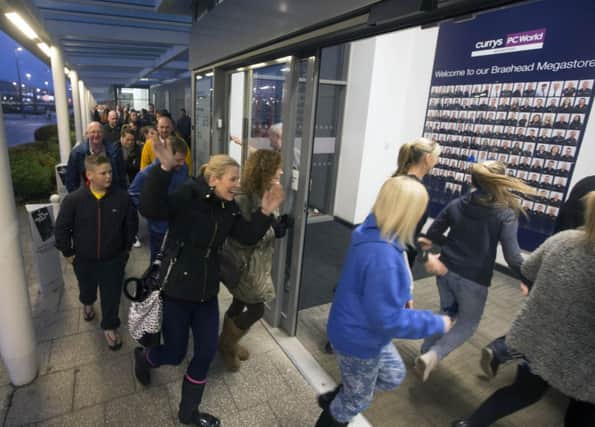Leader: Retailers should scrap ‘Black Friday’ hype


Stores had to be closed for a short while in Glasgow and Dundee amid concerns over crowd behaviour. Similar incidents were reported across the UK, with seven Tesco stores hit in Manchester, and trouble broke out in Wigan, Cardiff and London. Problems spanned abusive and threatening behaviour, staff being assaulted, and in one store a customer being hit by a falling television.
Pre-Christmas shopping has long been a frenzied and stressful affair. But the problems yesterday were particularly severe and widespread, due in large part to a manufactured marketing hysteria over the significance of “Black Friday”.
Advertisement
Hide AdAdvertisement
Hide AdAggressive marketing is one thing. Hype is quite another. And there can be little doubt that yesterday’s disorderly scenes stemmed from the hype over a shopping date after Thanksgiving Day in America when the volume of pre-Christmas trade pushes the takings of stores into the black for the first time in the year.
Meaningful though this may be for retailers, it is no excuse for generating an atmosphere of near-hysteria with its accompanying physical dangers to customers. The result is now the very opposite of the store giants’ soft-focus emotional TV advertising with scenes of warm household festive cheer.
Next up is “Cyber Monday”, the day on which shopping on the internet reaches its peak. The archetype online female Christmas shopper is now more often pictured wearing pyjamas, relaxing on a sofa with a laptop balanced on the knee, a credit card nonchalantly waved in readiness – and the bliss of effortless shopping from home captured in a beatific smile. No queues, no crowds, no fights, no aching feet – just a continuous hassle with PayPal protocols, wi-fi disconnects, previous orders wiped out and sales that don’t register.
CONNECT WITH THE SCOTSMAN
• Subscribe to our daily newsletter (requires registration) and get the latest news, sport and business headlines delivered to your inbox every morning
Yet even here, aggressive hype is taking over. Some retailers, reluctant to wait until this coming Monday, have brought their marketing forward and created the equivalent of Crazy Cyber Week, with special offers on electronic gadgets and laptops.
We know retailing is going through a torrid time. But goading customers to flock to the stores in huge numbers on a set day is irresponsible. Pre-Christmas trade was looking good without resort to frenetic marketing. The CBI Distributive Trades Survey out this week revealed a relatively healthy picture with signs that this will be a decent Christmas for the retail trade.
The sector needs to take a long, hard look at the consequences of this manufactured – and wholly avoidable – mayhem and adopt more responsible marketing strategies.
Pressing need for a ‘reset’ button
Gordon Brown’s speech today will set out ambitious objectives that have become a familiar part of his rhetoric – ending youth unemployment, radical improvements to the NHS, improving pensions, a radical attack on poverty and inequality.
Advertisement
Hide AdAdvertisement
Hide AdFor some this may be simply a re-statement of familiar Brown political rhetoric, heavy on moral mission but thin on the means by which such lofty aims can be achieved.
But his starting point has resonance: after two years of intense concentration on constitutional change, it is time to move on. “I am pressing the reset button,” he will argue, “because it is time to move beyond the old issue of bigger powers for the Scottish Parliament to the issue that really concerns Scotland – better lives for the Scottish people.”
This is a welcome appeal. Political debate throughout the referendum campaign and now in the aftermath of the Smith Commission report, has been dominated by discussion on whether the proposed “more powers” are adequate or not enough, rather than on what the new powers should be used to achieve. This battle over Scotland’s constitutional future should have as its heart a sense of clear achievable ends to which the enlarged competence of the Scottish government should be put, rather than building an impressive-looking trophy cabinet of powers gained from Westminster. There is much to do, both to improve the quality of life for five million Scots, and to ensure that we have a business environment and incentives conducive to sustaining a strong economic growth rate. Mr Brown’s speech points the way to a more constructive – and long overdue – focus.
SCOTSMAN TABLET AND IPHONE APPS